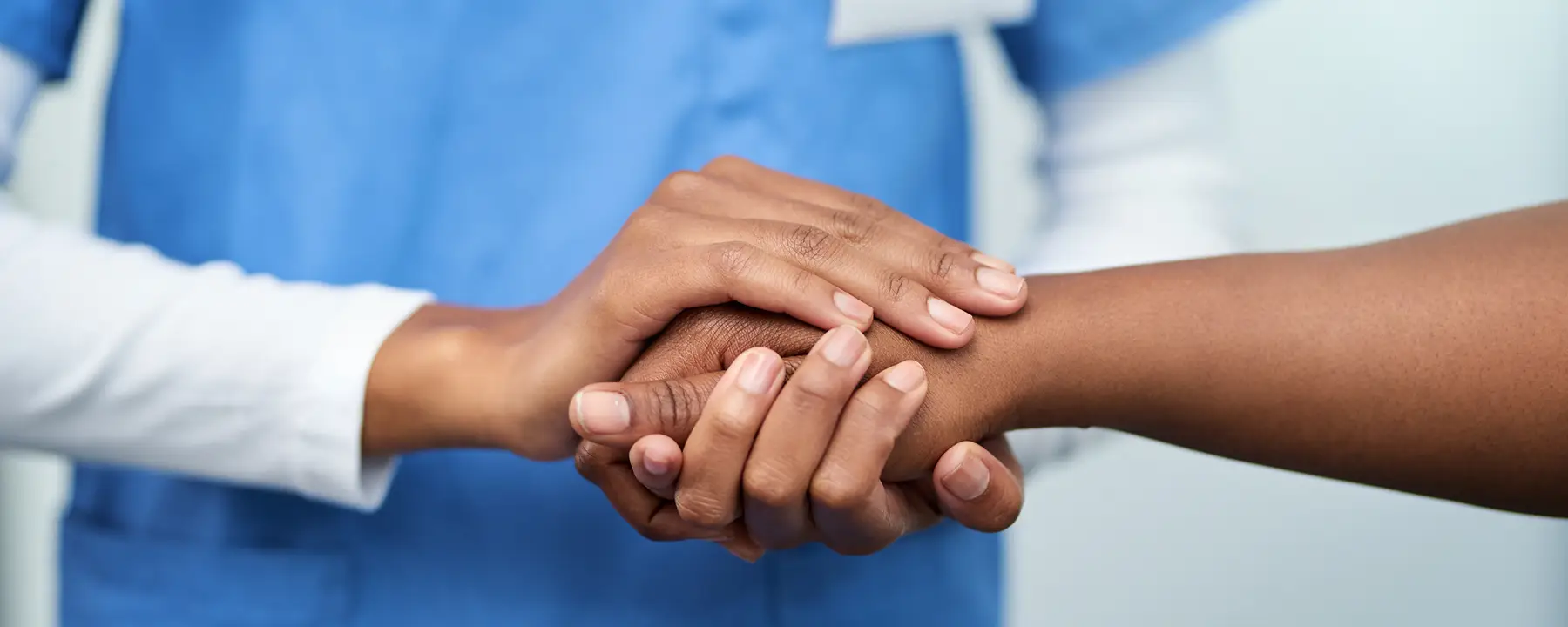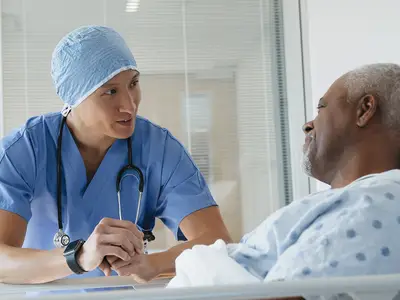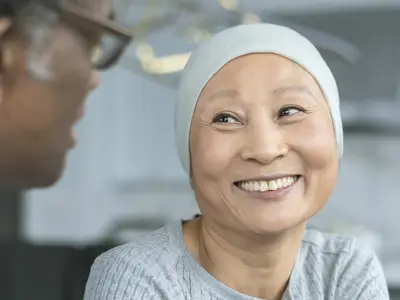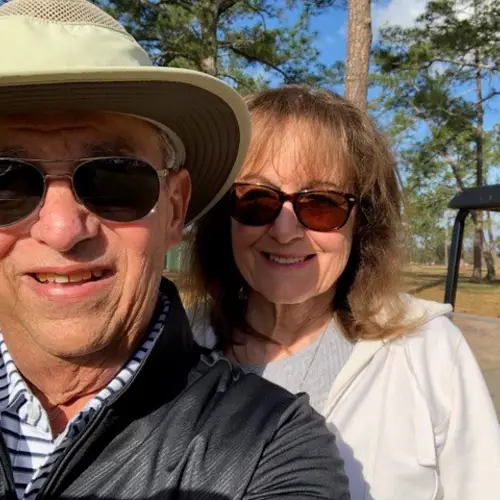
Meet Michael
Cancer Survivor
Michael is a cancer survivor with a zeal for life that is contagious. Less than a year ago, while recovering from knee surgery, Michael noticed a lump on the left side of his neck. After a CT scan and two biopsies, he received a diagnosis of throat cancer. Due to pandemic restrictions, he received the diagnosis in a telephone call from one of his doctors. A cancer diagnosis is a stressful event under any circumstances, but the stress and hardships of cancer treatment during COVID-19 created an additional layer of uncertainty and anxiety for Michael and his family. Thanks to his wife and adult children, Michael had a strong support system. However, COVID-19 restrictions eventually prevented his wife from attending his appointments. Michael went to his appointments alone and his wife waited in the parking lot or made multiple round trips on chemotherapy days—four hours was a long time to wait in the car. Michael’s wife once waited six to seven hours, while he sought treatment in the emergency room. On both occasions, Michael’s youngest daughter drove to the hospital and joined his wife in her car to keep her company during the time it took to resolve the medical issues.
The pandemic amplified the uncertainties that Michael experienced during his cancer journey. Like most cancer patients, Michael was at greater risk for COVID-19 because he was immunosuppressed. Concerns about contracting COVID-19 affected every area of Michael’s life. Many of his colleagues were younger and were not really concerned about the pandemic. This led Michael to begin teleworking before he had to stop working altogether. Simple activities like visiting with family and grocery shopping were upended. Saturday and Sunday mornings began with early morning trips to the store in hopes that the store was empty. Visits with grandkids suddenly stopped and several months passed before Michael was reunited with his grandkids. The first holiday missed was Easter, and soon thereafter, Mother’s Day. Holidays in Michael’s family were always big events with Michael cooking up a big meal. This year there were no hugs, kisses, or big meals. They simply talked in the driveway, socially distanced and masked.
Despite daily challenges and disruptions to Michael’s cancer care and treatment, the pandemic could not overshadow the compassion and kindness that Michael’s healthcare team provided. Michael was touched by how gentle and thoughtful his healthcare team was when prepping him for radiation treatments. Similarly, nurses from the infusion unit always came to talk with him. Despite being busy, they showed genuine interest in his well-being. Even interns brought Michael lunch and snacks. Cancer care and treatment are uniquely challenging, but these challenges are compounded when COVID-19 restrictions require patients to attend medical appointments or emergency room visits alone. Michael’s healthcare providers made him feel heard and answered his questions. Even small things like treatment simulations helped reduce anxiety and helped Michael better understand how a treatment or procedure might proceed.
These days, Michael enjoys taking trips to the beach with his wife. You can also find him playing golf, enjoying his grandkids, or applying nearly four decades of law enforcement expertise to clemency investigations in Florida.
I hope that they (health care providers) understand how terrifying a cancer diagnosis is during the pandemic. It's bad enough in regular times, but it's even worse when a happenstance meeting of someone can be the end of your life.
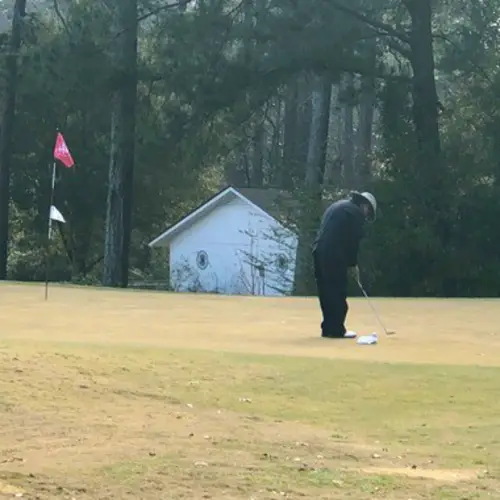
Michael: Why Exchanging Information and Managing Uncertainty Are Important to Me
Exchanging information helps healthcare providers and patients achieve a shared understanding during cancer care and treatment. It begins when healthcare providers assess and understand an individual patient’s information needs. Michael’s healthcare providers asked key questions to determine if he had prior experience with cancer. Office visits were turned into classrooms where Michael could learn about the purpose of procedures and the significance of test results. Michael’s healthcare providers were also interested in his life beyond cancer—his work, family, and religion. It helped them better understand how treatment might impact his overall life.
Michael’s healthcare providers were honest about the severity of his cancer and did not sugarcoat his treatment process. They explained everything—what the side effects were and when they would likely occur. Michael fully understood how serious the pain and discomfort would be. Their honesty helped Michael be better prepared for the very difficult and nearly intolerable moments during his treatment. Michael’s oncologists also assured him that it was ok to be upfront about pain—his healthcare team knew how much pain medication he could safely tolerate and how to avoid risk of addiction. These discussions also helped Michael and his wife plan for some of the unknowns. When possible, treatments were scheduled to accommodate work schedules, and they knew when treatments would likely require that they both stop working. As a result, they were able to set money aside in advance to cover expenses during that period.
Michael’s healthcare providers also provided much-needed information to help him stay safe during COVID-19. Family get togethers were limited to drive-bys, driveways, and waves from the window; and shopping was limited to necessities and early morning trips when fewer people were in the store. Michael even wore a mask and used hand sanitizer when receiving packages at home. After six months of treatment, an amazing thing happened. Michael’s hematology oncologist suggested he go golfing! He understood the importance of getting exercise and fresh air and knew it would do Michael good, if he wore a mask and practiced social distancing. Ongoing discussions and exchange of information helped Michael and his family prepare for and manage many of the uncertainties of cancer treatment. Michael was able to successfully navigate the added disruptions, social isolation, and related anxieties of cancer care and treatment during COVID-19.
...there really weren't any surprises for us...I think that helped us manage our care and our condition, especially during the pandemic when a lot of the things that you might have been able to do, you really couldn't do.
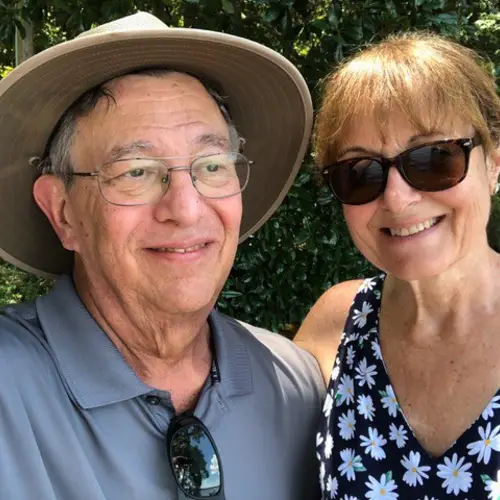
Michael: Why It’s Important to Foster a Therapeutic Relationship and Respond to Emotions
A patient’s cancer journey is full of unexpected twists and turns and stops along the way. That is why each member of a healthcare team has an essential responsibility to provide medical, physical, and emotional support during cancer care and treatment. To the patient, each healthcare team member is a touchpoint, an opportunity to build trust, rapport, and commitment to achieve a shared goal. These healing relationships are an integral part of every patient’s cancer journey and Michael’s journey was no exception. The healthcare team at Tallassee Memorial Cancer Center provided Michael with exceptional care. They were always honest. In fact, Michael’s radiation oncologist was brutally honest about the pain and discomfort he would experience. His honesty meant the world to Michael. When he started the more difficult part of his treatment, Michael never thought, “No one told me it would be this way.”
Many things are uncertain during a cancer journey, but Michael never had to worry about being able to get in touch with his healthcare team. If Michael called, he could always get in touch with at least one of his oncologists or the oncologist on call. On two occasions, Michael had to go to the emergency room. Both times his oncologist called in advance and had someone there to meet him. Michael’s healthcare providers also ensured continuity of care by always sharing the results of Michael’s bloodwork with his other healthcare providers. Even Michael’s patient navigator made his outside appointments and scheduled tests. Michael was treated as an individual—never as just another patient. He never felt like a random guy sitting in a chair getting chemotherapy. Instead, he was asked questions about what mattered most, his wife, family, and what he did for a living. The care and information that Michael received was personal and was based on a mutual understanding with his healthcare team.
The emotional impact of a cancer diagnosis, care, and treatment can be overwhelming. Michael’s oncologists and nurses made a point to talk to him about how he was feeling at every appointment. There was no question that someone was reading the intake form that Michael completed at each visit. After a particularly difficult chemotherapy appointment, Michael’s patient navigator, seeing Michael crying on his way to his radiation treatment, stopped, gave him a hug, and consoled him for almost 30 minutes. A mental health counsellor also called as soon as he arrived home to make sure he was okay. They talked for an hour. It made all the difference to Michael. He knew he wasn’t just another patient in the hospital. Michael’s healthcare providers were able to respond to his needs with empathy and support because they understood him as a person. These healing relationships are even more important as many patients, like Michael, cope with the stress of isolation and fear while receiving treatment during COVID-19.
I had so many questions after the treatment ended and how long is this going to go on? Am I going to have a recurrence? And they explained all that to me and that meant a lot. I didn't have to worry if I’m going to be on my own three months afterward.
Meet Lera
Caregiver, Advocate
Patient-centered communication is a multidimensional process that includes exchange of information between healthcare providers, patients, and their caregivers. It’s important to give patients and families the right information at the right time. Lera’s experience with her son motivated her to join Fight Colorectal Cancer to ensure that other patients and families have access to the information and resources they need. Watch this video to gain a better understanding on the importance of patient-centered communication along the cancer journey.
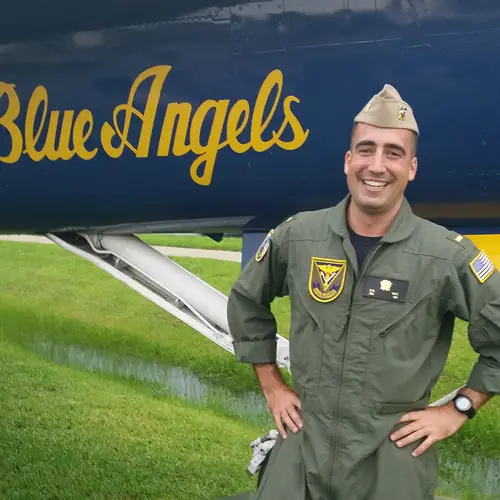
Meet Ben
Cancer Survivor, Advocate
Ben is a cancer survivor and advocate and he is committed to changing the face of colorectal cancer. Five years ago, Ben was living his dream as a pilot in the Navy when he began to have abdominal pain and discomfort that gradually worsened. Despite having classic symptoms, Ben did not fit the profile of someone with colorectal cancer. He was only 26. After a long and frustrating search for answers and relief, Ben’s diagnostic odyssey ended abruptly when he awoke from exploratory surgery with a colostomy. His surgeon had found cancer.
Ben’s treatment began in Florida, where he was stationed, and led him across country to California where his family lived. Although Florida offered state-of-the-art treatment and facilities and a network of friends, Ben’s move to California gave him a much-needed community of care. His new healthcare team took the time to know him. Ben was more than a patient. His healthcare providers established a personal connection with him—his concerns were their concerns. Based on their mutual understanding and respect for each other, they moved forward with a treatment plan that sought to preserve his career (medical standards for aviation are high) and aspects of his life that were important to him as a young man, such as his fertility.
Genuine and ongoing communication is an investment that builds trust, rapport, and commitment between patients and their healthcare team. Healing relationships ensure that the person, not just the patient, receives knowledge, information, and treatment that is based on a shared understanding of what matters most to them.
It’s important to get to know the patient as a person. Every patient...every journey is different. It doesn’t matter if you fit the profile or not.
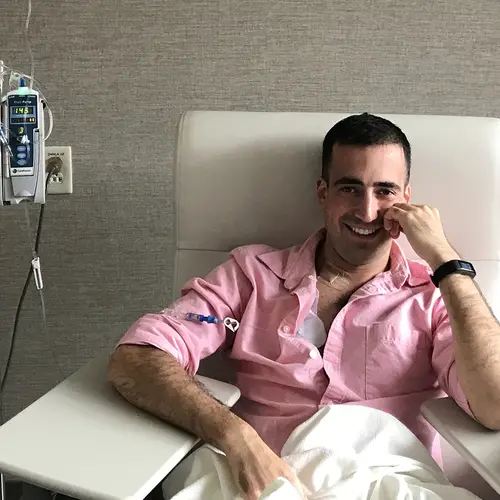
Ben: Why Decision-Making is Important to Me
Cancer treatment—what is most effective, safe, and even cost-effective, can often overshadow other important aspects of a patient’s life, like their quality of life, goals, and priorities. Ben’s oncologist made sure he understood his treatment options and that the options reflected his values and preferences. Whenever it was time to make a decision, Ben’s healthcare team presented his options for treatment, made recommendations, and discussed potential side effects and outcomes. These interactions empowered Ben to make decisions that best aligned with his personal needs.
As a person diagnosed with colorectal cancer at a young age and a promising career, it was important that Ben approached each decision with a clear understanding of his treatment options and potential outcomes. It was equally important that his healthcare team respect and support his decisions. Although Ben’s decisions usually aligned with his oncologist’s recommendations, no assumptions were ever made. When Ben was given options for the length of his treatment (three or six months), his oncologist made sure Ben’s input was central to the decision-making process. Given his age and risk for reoccurrence, the choice may have been obvious. As a cancer survivor, Ben went on to graduate from biannual CT scans to annual CT scans. Understanding the significance of this change and how Ben might feel about reducing the frequency of screenings, his oncologist offered to continue scans at six-month intervals to help reduce any worry or anxiety Ben may have had.
Communication that facilitates shared decision-making is essential to cancer care and treatment. This approach ensures that decisions are informed by the best scientific evidence and reflect the patient’s values and preferences.
My oncologist always made me feel that it was OK to make the decision that was right for me...
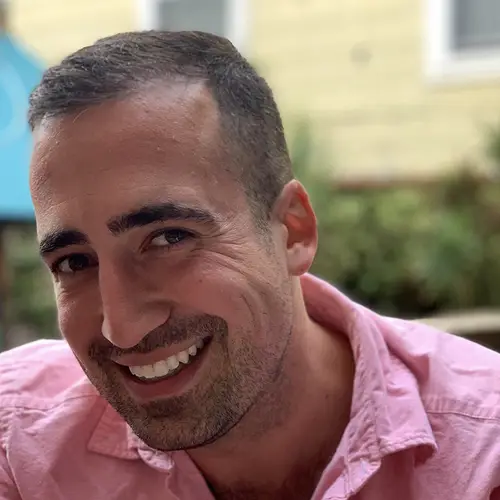
Ben: Why It’s Important to Manage Uncertainty
Life changes in unexpected ways with a cancer diagnosis and uncertainty is a constant companion along the cancer journey. Ben’s early onset of colorectal cancer left him with a host of uncertainties. Many of these uncertainties were unique to his cancer journey. Most colorectal cancers occur in people older than 50 and men are typically in their early 60s when diagnosed. Ben was just 26 at the time of his diagnosis.
When met with the reality of his cancer diagnosis, Ben had to abruptly shift focus from a burgeoning career to navigate a health crisis that would require a community of care. He would need the support of his family—family that lived nearly 3,000 miles away. With guidance from his healthcare team, Ben was able to successfully manage where his treatment would occur and who would take care of him. Despite limited prognostic information for his age group, Ben’s oncologists were proactive about addressing uncertainties and preparing him for different treatment scenarios and potential outcomes for his health and career. His oncologist also communicated early and often about uncertainties related to questionable lab results, follow-up, and reoccurrences by offering ongoing support and information. As a result, Ben knew what to expect and was better prepared to deal with uncertainties.
Communication that acknowledges uncertainties and offers information, support, and strategies can help prepare patients to manage uncertainties, reduce anxiety, and improve health outcomes for people diagnosed with cancer.
Early on, my oncologists let me know what might happen and what they would do. It helped build trust and made it easier to deal with uncertainties with less anxiety.
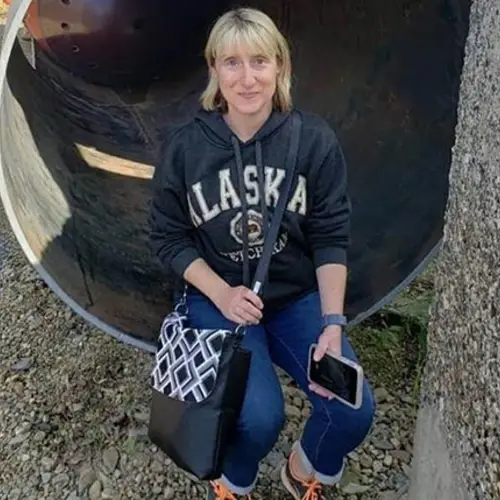
Meet Kellie
Caregiver, Advocate
Kellie is a caregiver turned advocate who is giving back to the patient community. A cancer diagnosis is a traumatic life event that can easily overwhelm a patient and their family. Kellie’s mother was barely conscious in the recovery room following a colonoscopy, when she was told she might have cancer. The diagnosis was intermingled with voices of other patients—strangers—just beyond the sheet that separated them. Once alert and dressed, her mother was promptly notified of her appointment with an oncologist. As her caregiver, Kellie was left to wonder why her mother was given a diagnosis while still in recovery. There was no explanation of what to expect, and no one took the time to share the news with Kellie. Both moments were missed opportunities to communicate in a way that established trust and fostered healing during a very difficult time for Kellie and her mother.
Kellie’s passion for awareness and compassionate care is fueled by the many challenges that she and her mother experienced while seeking care in their small town and in a large hospital more than 300 miles from their home. Neither Kellie nor her mother were aware of important social and emotional supports available to them during their cancer journey. These hard-learned lessons are guideposts to educate and empower patients to help them receive care that is attentive, responsive, and tailored to their needs. Kellie hopes that knowledge gained from her experience will help others navigate their journeys with dignity and the respect they deserve.
Effective communication is a key component of cancer care. Informative, responsive, and compassionate communication equips patients and their loved ones with knowledge and resources to better manage difficult news and handle the impact of their diagnoses.
I wish so much that we had had the resources that I have now. We were never informed that the American Cancer Society will help pick you up, and they have volunteers that will take you to chemo, and everything.
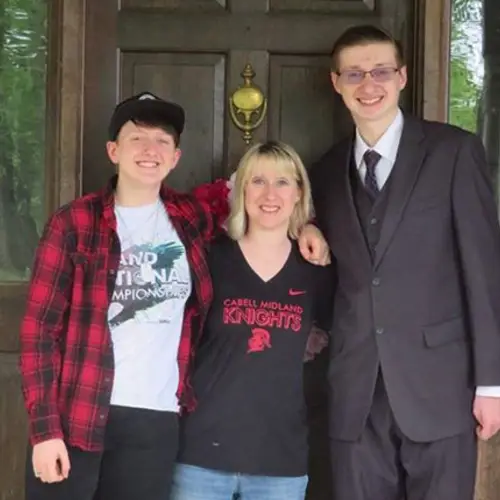
Kellie: Why Building Relationships with Doctors is Important to Me
Kellie’s mother was fortunate to have a compassionate oncologist. He took the time to explain complex information and was always professional. Simple things like scheduling separate non-chemo appointments for important discussions helped Kellie and her mother know that the oncologist not only cared, but also understood how vulnerable she might be after treatment. The oncologist demonstrated the same level of care when he shared the news that he was leaving the practice. Although this was another difficult moment in their cancer journey, the oncologist was prepared with information that was important to Kellie’s mother—who would take over her care? This interaction was one of many pivotal moments that took Kellie and her mother from their small town to a large teaching hospital for cancer care.
Despite all the promise that the teaching hospital offered, the hustle and bustle of the environment left little time for patient-provider dialogue and acknowledgement of how Kellie’s mother felt. She was frequently rushed in and out of appointments and often felt like a medical experiment. Physicians regularly flooded her room with residents who were seemingly more interested in her ostomy bag than in her as a person or her comfort and wellbeing. Those moments might have been easier to handle if Kellie’s mother had been introduced to the residents and given an explanation on why they were there. These interactions did little to strengthen the patient-provider relationship or address her mother’s needs, perspectives, or preferences regarding her care.
Patient-centered communication is an essential component of high-quality cancer care. Every encounter with a patient and their family is an opportunity to build trust and rapport. By fostering healing relationships, physicians can help patients and their families deal with difficult news and make informed decisions about their care. Here are a few things that can be done to build trusting positive relationships with patients and caregivers:
- Always introduce yourself, especially when entering a patient’s room
- Introduce other members of the team and explain their roles in the patient’s care (e.g., introduce residents at teaching hospitals)
- Have sit-down conversations with patients and families outside the exam room whenever possible
- Do not rush difficult conversations
- Treat patients with respect and dignity, especially at a time when they feel most vulnerable
- Ask patients and families how they are doing emotionally and whether they have the support they need; let them know about support groups and other sources of support.
It only takes a moment to be kind.
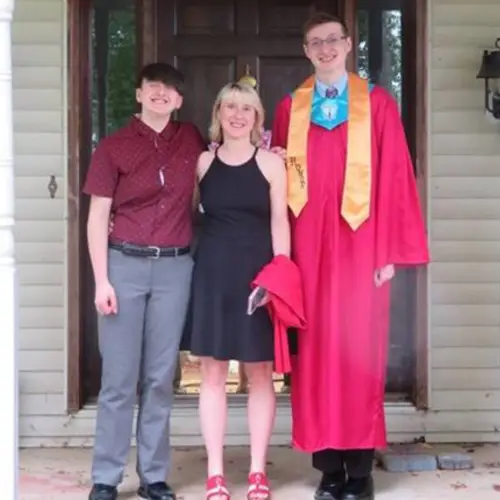
Kellie: Why Paying Attention to Emotions is Important to Me
A cancer journey can be an intensely difficult experience for both the patient and family. As a caregiver, Kellie had a front-row seat to her mother’s frustrations as treatment options diminished. Despite many appointments and office visits, the emotional and mental aspects of their journey were not addressed. Counseling referrals were not given, neither were social services nor support groups recommended. The focus remained on treating the cancer, missing an all too important aspect of cancer care—mental and emotional health/support. Kellie and her mother were forced to manage the emotional impact of her mother’s illness without support. Worn, frustrated, and nearing the end, Kellie and her mother fought hard to exit treatment and enter a supportive environment where her mother’s needs could be met.
Hospice opened a new world to Kellie. Not only was there an entire team dedicated to her mother’s care, but there were people who cared about Kellie as well. It was the first time someone had considered her feelings as a caregiver and acknowledged that her mother wasn’t the only patient—Kellie wasn’t just a caregiver. She was the other patient in her mother’s journey. Kellie was encouraged to eat, take walks, and take time to care for herself. After all, Kellie was a mother and worked full-time. Many of the resources and support systems that Kellie came to learn about were not discovered in time to help her mother. That is why Kellie is committed to helping others understand their options as patients and caregivers. She hopes to empower people with information to make decisions about their care, enable self-management, and increase cancer awareness.
Communication that acknowledges patient emotions and offers validation, support, and empathy helps patients better manage the emotional aspects of their cancer journeys and improves health-related quality of life. The following tips can help physicians understand and respond to patients’ emotional needs:
- Be compassionate
- Ask about the patient’s social support
- Remember, even though a physician has given many people a cancer diagnosis, this is the first time for the patient
- Don’t forget about the caregiver—ask how the caregiver is coping (e.g., stress, fatigue, isolation), then assess and provide support.
I just think they forget to treat the whole person. I think they know, 'okay this person has cancer, so these are the steps...' No one ever really came across as caring about our mental health.

Meet Wenora
Cancer Survivor, Advocate
Wenora is a vivacious cancer survivor who is living with Lynch syndrome, a genetic condition that increases the likelihood of many types of cancer. As an engaged patient (who has survived multiple cancer diagnoses), Wenora understands the importance of quality relationships with her healthcare team. Wenora’s story underscores the essential nature of patient-centered communication that builds trust, rapport, commitment, and mutual understanding through communication.
From her initial diagnosis to her referral and subsequent journey with her oncologist, regular communication and follow-up have assured Wenora of her oncologist’s care and commitment. As a result, the physician’s office is a safe space where Wenora is encouraged to ask questions and express concerns, whether great or small. This invitation for open and frequent communication extends beyond the walls of the oncologist’s office to questions she may have after an appointment or while viewing her online patient profile.
Genuine and regular communication, along with competent care, empowers patients to navigate their care by understanding risks, informing treatment decisions, and managing the emotional aspects of a diagnosis.
Communication, I would say, is probably vital, number one... top of the list.
– Wenora, Cancer Survivor & Advocate
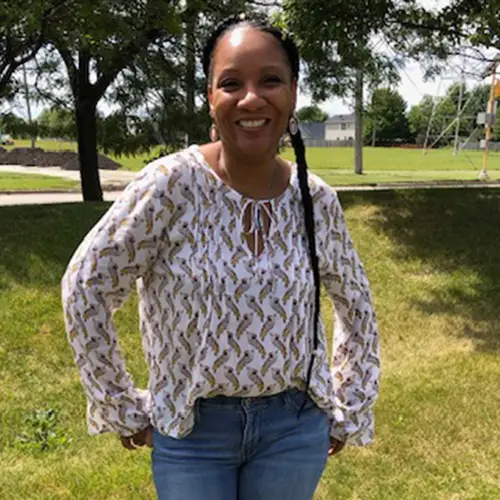
Wenora: Why Shared Decision Making is Important to Me
Wenora knows what’s right for her and makes sure she is informed. With her first cancer diagnosis, she knew that she wanted the level of care that her local oncologist could provide. After three months of chemotherapy and discussions with her oncologist, she also knew her body had had enough. She decided to stop chemotherapy. At every opportunity, her oncologist provided information to help Wenora think through her decision. She even encouraged Wenora to speak with another physician, but equally understood and respected Wenora’s decision.
Wenora’s oncologist also suspected that she had Lynch syndrome, because of the type of cancer she had. Lynch syndrome patients are genetically predisposed to different types of cancers. Her oncologist recommended genetic testing at every opportunity—she would even code the test to reduce the burden of the expense. Two years later, Wenora took the test. As suspected, Wenora was a Lynch syndrome patient with an 80 percent chance of getting endometrial cancer in five years. Thanks to her oncologist’s frank discussions about preventive care, Wenora decided to have a hysterectomy and later learned that endometrial cancer was already present. Because of her oncologist’s persistence in sharing vital information about Lynch syndrome, Wenora was able to avoid another round of chemotherapy and treatment.
Patient-provider dialogue about decisions is important in all phases of cancer care. This dialogue helps patients and physicians make decisions based on the best scientific evidence and understanding of what matters most to patients.
...shared decision making helped me when it came to a third cancer, so it’s just imperative that you have that good dialogue and relationship with that provider.
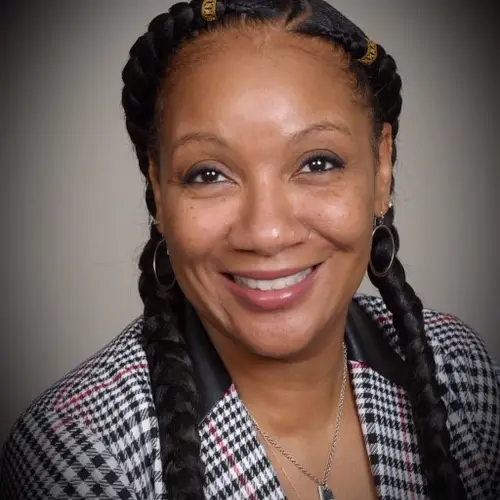
Wenora: Why Information Exchange is Important to Me
Office visits are a routine part of cancer care and treatment. That’s why Wenora makes sure her office visits are anything but routine. Her oncologist always asks questions, but so does she. In fact, Wenora prepares questions for each visit, and with this simple act, her oncologist knows that she takes her healthcare seriously—her healthcare team is more engaged and more thoughtful when sharing information. For Wenora, these interactions are invaluable—through dialogue and sharing information, they establish a mutual understanding for treatment goals and of her personal values and preferences.
Physicians share important information in a number of ways and settings. As a patient, Wenora believes that information exchange begins the moment she arrives at an office visit. In the waiting room, she reads cancer-related magazines and articles. During her office visit, she engages in face-to-face discussions with her oncologist, where direct eye contact and personalized questions communicate care and interest in her cancer journey. Upon departure, Wenora is equipped with printouts and brochures, as well as other important information like test results, and visit reminders, because sometimes it’s simply too hard to remember everything discussed during a visit.
Information exchange is a two-way process that helps physicians better understand, assess, and meet their patients’ information needs. It also fosters shared understanding and promotes shared decision making for cancer care and treatment.
...if you're talking to me and you're looking me in the face, then... that's where I'm sensing your empathy and you’re understanding of my plight about the decision I have to make about my health.
